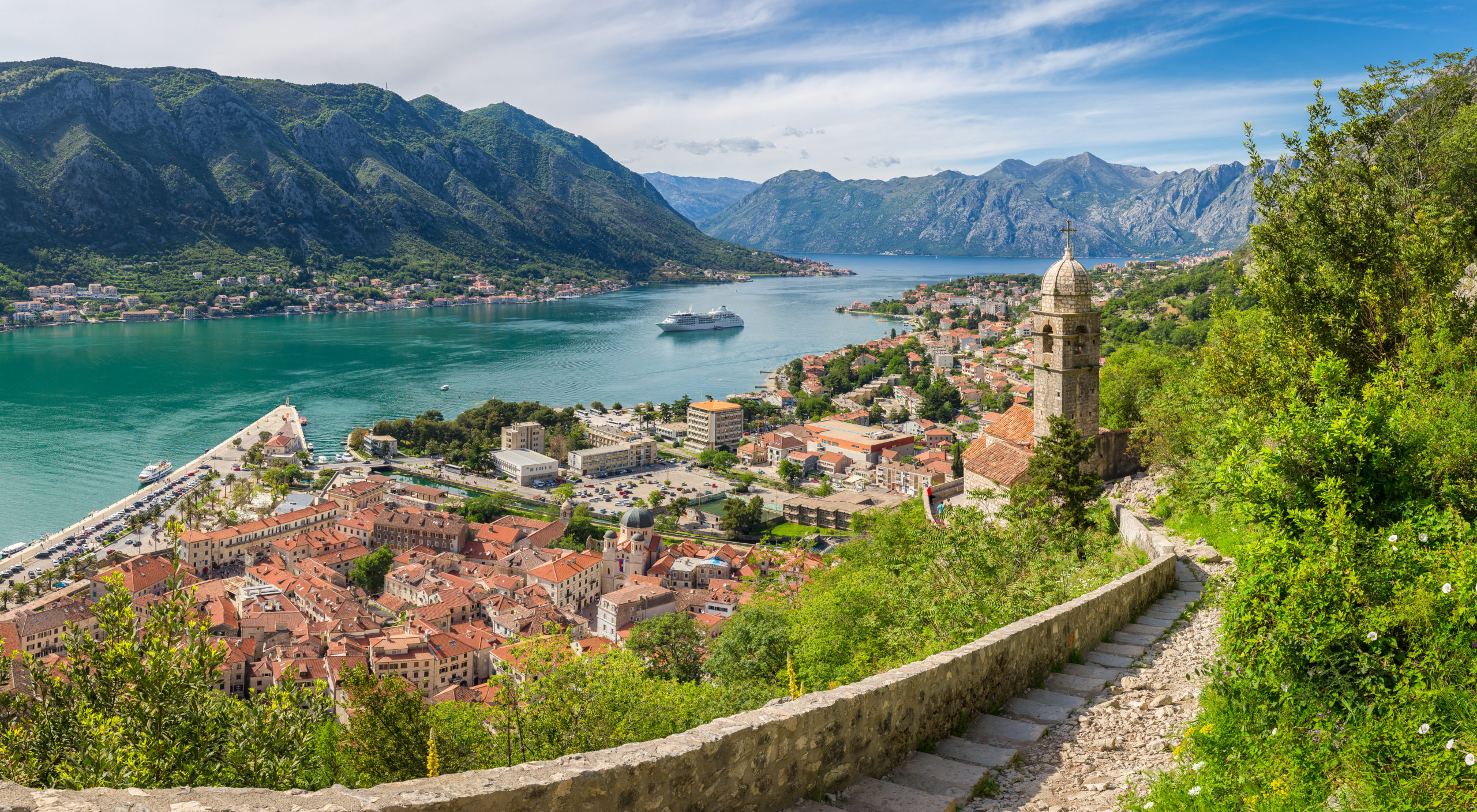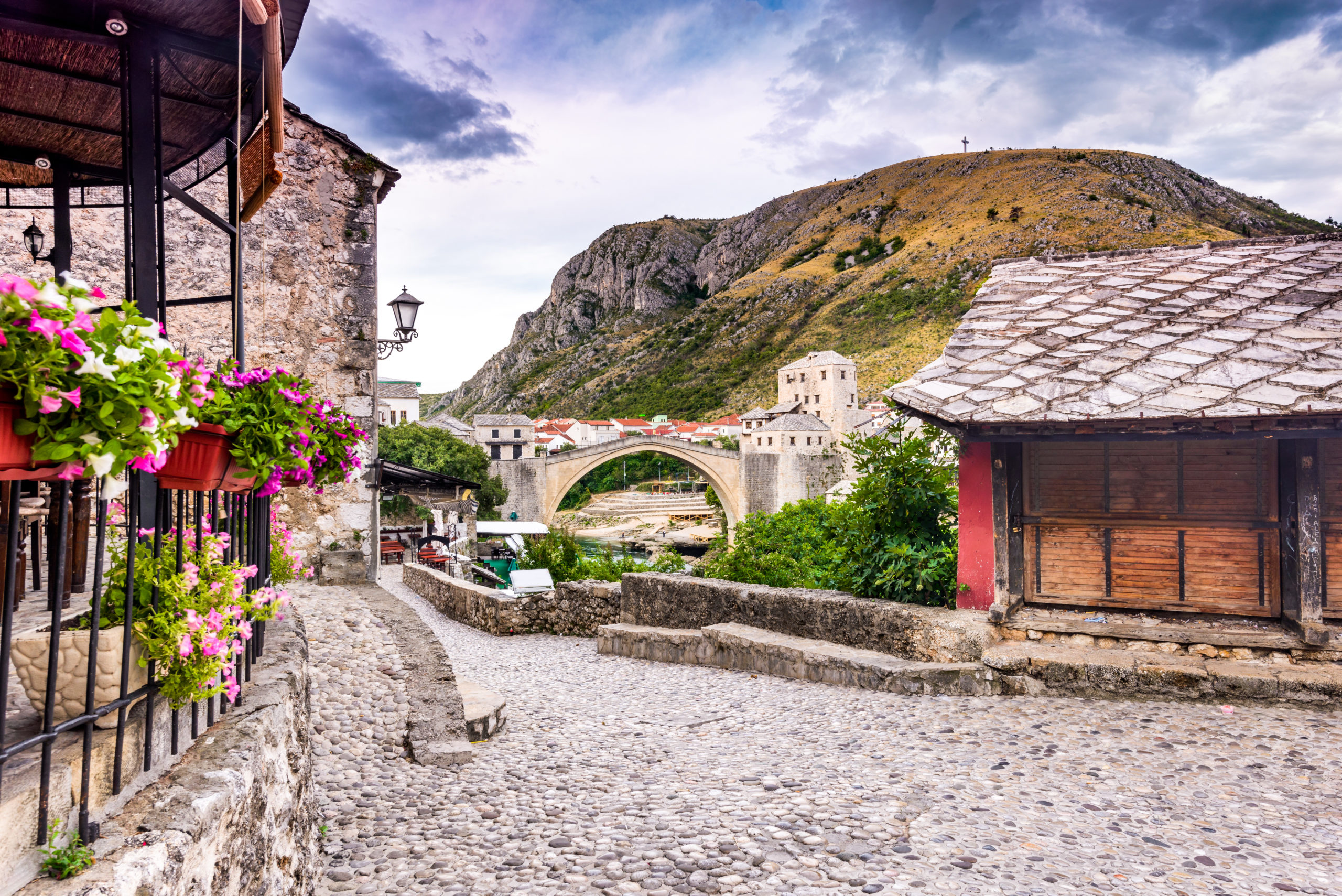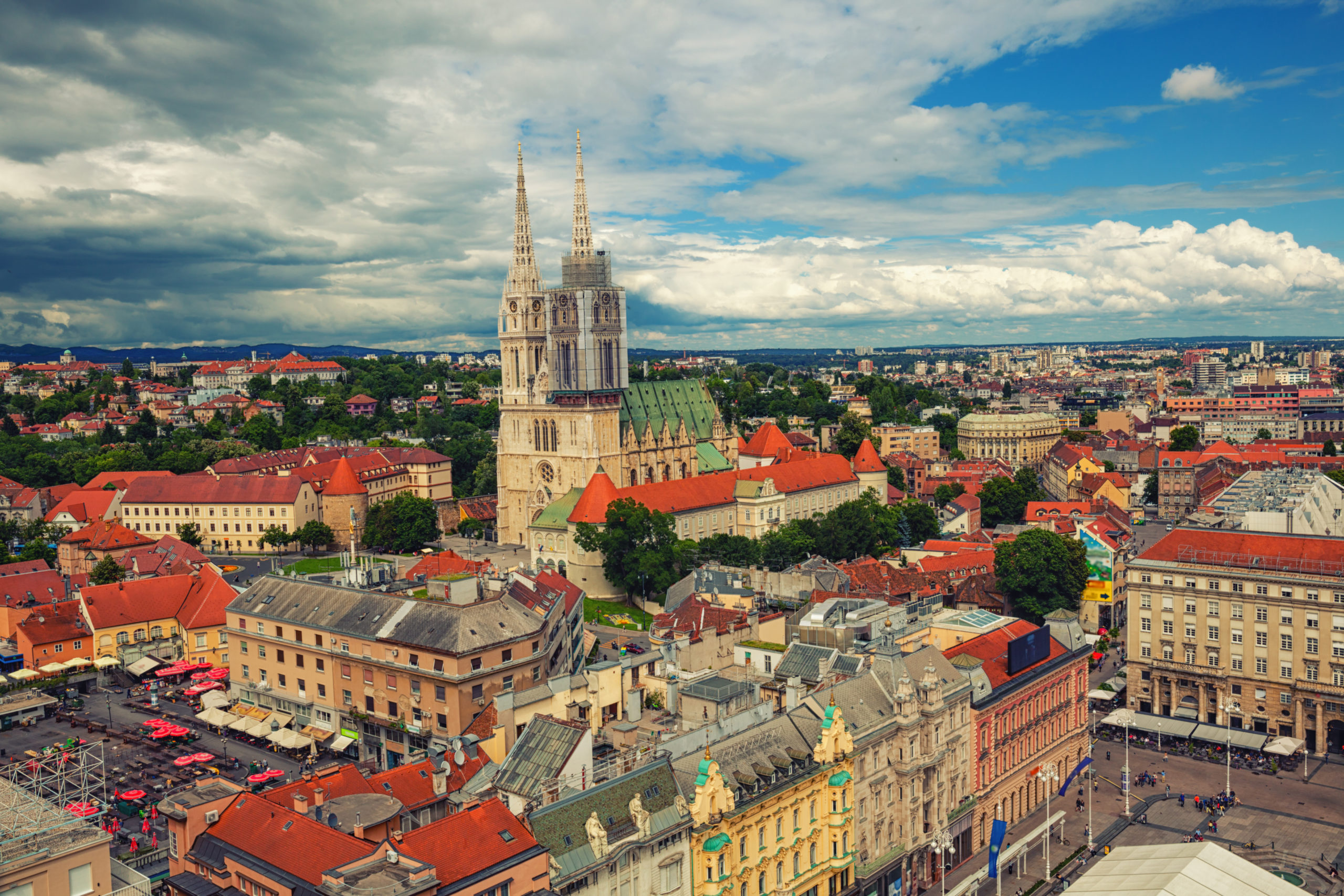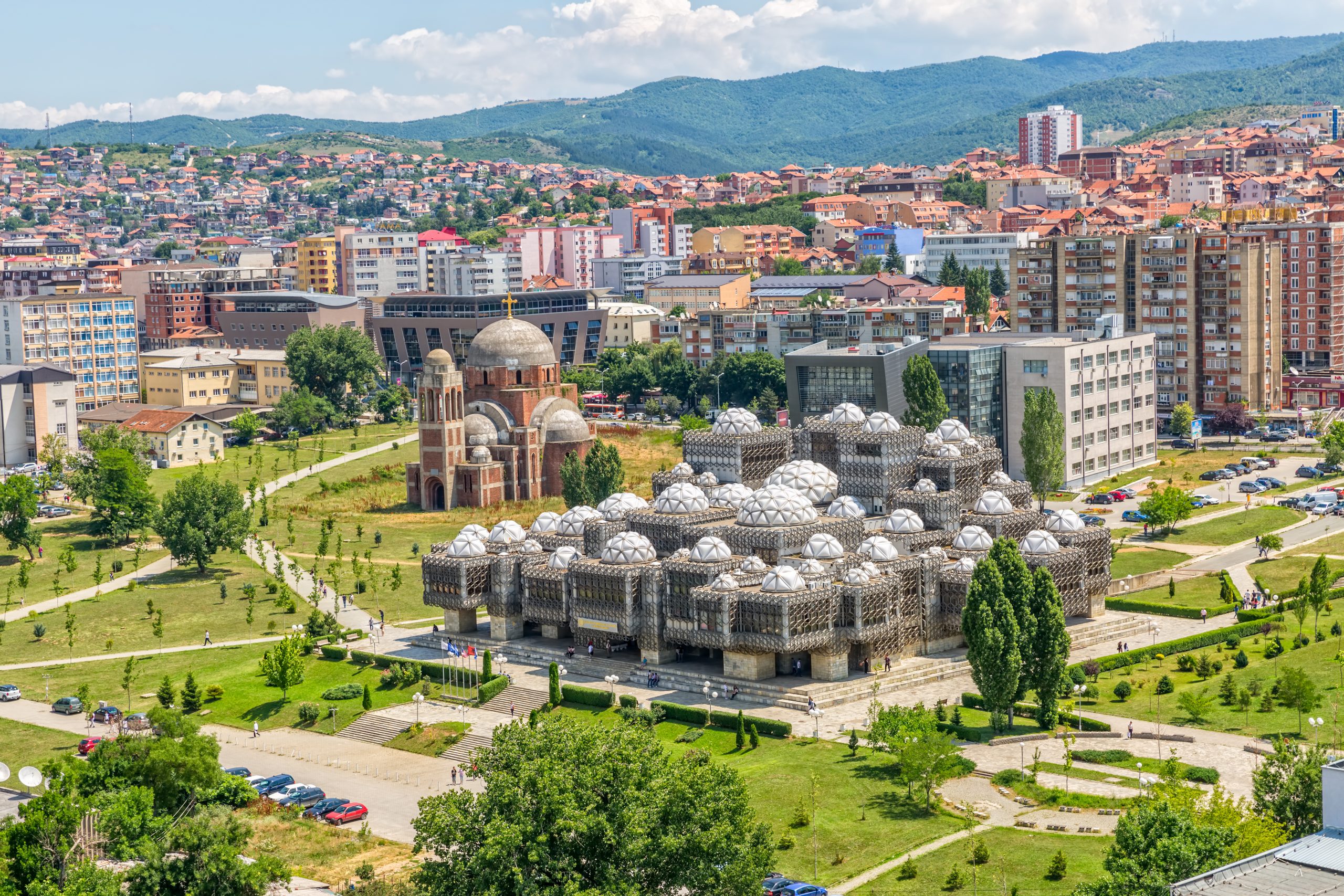Strategic Analysis Balkan Brief
Second half of March 2023
Petra Bošková, Barbora Tomanová, Chiara Mihalčatinová, Adam Šiko, Lýdia Chobotová, Natália Lešňovská

Bay of Kotor, Montenegro. Photo: Shutterstock.com
Albania
Albania Under Fire for Pursuing ‘Golden Passports’ Despite EU Backlash
Brussels has expressed concerns over Albania’s proposed plan, citing that it contradicts the EU’s core values. The European Union has cautioned that the move could potentially cause obstacles to Albania’s efforts to become a part of the bloc.
Albania’s Prime Minister, Edi Rama, has suspended the country’s controversial “golden passports” scheme, which offers citizenship in exchange for cash or investments until the European Court clarifies its position on the matter. The scheme has faced strong criticism from the EU, which has urged Albania to abandon it or risk its citizens’ free movement in the EU. Rama has stated that the country has not invented the scheme but rather took it from EU countries that have implemented it successfully. However, the EU has expressed concerns about the practice, and similar citizenship schemes in North Macedonia and Montenegro have also faced criticism.
The “golden passports” scheme is associated with one of Albania’s most significant and controversial projects, the Durres Port. It had been planned that passports would be given for free to individuals who purchased apartments in the area. However, the EU has strongly criticised the scheme, and one of the articles of the project agreement revealed in November last year stated that foreign investors who buy directly from the property of the Strategic Investor in the project will have the right to apply for citizenship and/or permanent residence of the Republic of Albania.
Albania pushed changes to the law on private-public partnerships (PPPs) in August 2022, adding citizenship programs to the list in which the law can be used. The government has also been considering hiring private firms to promote the scheme to foreigners. However, Rama has declared that he will not give up on another controversial economic scheme – “fiscal amnesty.”
The most recent citizenship scheme in Europe for foreign investors was launched in January 2019 in Montenegro. The Montenegrin government offered passports to people who invested at least 250,000 Euro in undeveloped regions in the north or 450,000 Euro in more developed regions. The scheme’s former backers were among those who voted to scrap it.
Sources:
-
Fjori Sinoruka, Balkan Insight, „Albania Pushes for ‘Golden Passports’ Despite EU Criticism “, https://balkaninsight.com/2022/08/15/albania-pushes-for-golden-passports-despite-eu-criticism/
Bosnia and Herzegovina
The Republika Srpska has introduced two new undemocratic laws
Recently, not one but two laws were proposed by the Republika Srpska government that would significantly limit the space for civic engagement in the entity. If the laws were adopted, the entity would designate NGOs as foreign agents, and journalists would be subject to a fine for their work.
The first law on March 2 introduced fines for defamation up to 100.000 BAM (approx 50.000 EUR). According to the revisions, it appears that it will not be possible to write anything about a public figure’s personal or family life, whether it is about criminal conduct or morally dubious behavior. Since politicians are public figures, it will severely endanger the right of society to know what kind of person runs their state. Bosnia and Herzegovina was the first country in the region to decriminalize defamation. Thus, this proposal was perceived as a step backward in the media freedom climate as it would criminalize criticism, increase censorship, and prevent the work of journalists.
The law allowing the Republika Srpska to mark non-governmental organizations as “foreign agents” was proposed on March 8, just days after a similar law provoked mass protests in Georgia. Milorad Dodik, the entity’s president, claims that this law only copies the US legislation: “In their law, the US refers to foreign non-governmental organizations or those financed by foreigners as foreign agents on US territory.” However, the US embassy dismissed the comparison using a Russian parallel, where the same law and argument were used, and it eventually led to democracy’s repression.
Together with the US, the EU and OSCE also voiced their opposition to both legislative proposals. EU called it unacceptable and accused Republika of being afraid of civil society. OSCE marked such actions as contrary to international standards and emphasized that the OSCE will closely monitor the further development of the entity.
Sources:
- Azem Kurtic, BalkanInsight, ,,US, EU, Slate Bosnian Serb Push to Designate NGOs as ‘Foreign Agents’”,https://balkaninsight.com/2023/03/13/us-eu-slate-bosnian-serb-push-to-designate-ngos-as-foreign-agents/
- SarajevoTimes, ,,RS introduces Fines for Defamation up to 100.000 BAM”, https://sarajevotimes.com/rs-introduces-fines-for-defamation-up-to-100-000-bam/
-
Denitsa Koseva, Intellinews, ,,Bosnian Serb leader to copy law on foreign agents that sparked mass protests in Georgia”,https://www.intellinews.com/bosnian-serb-leader-to-copy-law-on-foreign-agents-that-sparked-mass-protests-in-georgia-272579/

Mostar, Bosnia and Herzegovina. Photo: Shutterstock.com
Croatia
„Completed Schengen“: Abolition of air borders
On March 26, Croatia’s airports dropped internal border controls for passengers traveling to or from the borderless Schengen Zone, potentially sparking an increase in its tourism sector.
The Balkan country famed for its spectacular Adriatic Sea coast officially joined the zone on January 1, 2023, but didn’t lift its air borders until Sunday to align the date with summer flight schedules.
Planes departing to or arriving from the area will now be treated as domestic flights.
Practically all flights to Croatia from Schengen countries and vice versa are now [the same as] domestic flights, without any documents control.
In December 2022, EU countries voted on whether or not to admit Croatia, Bulgaria and Romania into the so-called Schengen zone – a pact between countries to abolish border checks for those traveling between their territories.
Croatia received unanimous support from the 26 Schengen member states and joined Europe’s passport-free travel zone welcomed at the start of 2023.
Croatia also started using the Euro in January 2023.
Sources:
-
Charlotte Elton, Euronews, „Flying into Croatia just got easier: Air border controls dropped for Schengen zone countries“, https://www.euronews.com/travel/2023/03/27/passports-currency-and-borders-what-changes-when-croatia-joins-the-schengen-zone-in-2023

Zagreb, Croatia. Photo: Shutterstock.com
Kosovo
Problems with the implementation of the agreement on the normalisation of relations
Only a few hours after accepting an EU-backed deal to normalise relations between Kosovo and Serbia, the implementation process ran into an obstacle.
Interpretation of an EU foreign policy chief Josep Borrell is quite optimistic. After long talks on Saturday, March 18, Borell stated: “Kosovo and Serbia have agreed on the implementation annexe of the agreement on the path to normalisation of relations. The parties have fully committed to honour all articles of the agreement and implement their respective obligations expediently and in good faith.” Notwithstanding Borrell’s declaration, the two parties decided against signing the agreement. The Serbian president Vucic claimed that not all issues have been resolved by the parties. “We will not implement anything related to Kosovo’s membership of the UN or any kind of actual or de jure recognition of Kosovo,” said Vucic on Sunday.
It seems that the second most problematic point is the creation of an Association of Serb-Majority Municipalities with the authority to represent the Serb minority in Kosovo. On the other hand, US Special Envoy for the Western Balkan Gabriel Escobar told the media in Brussels on Monday, March 20, that the agreement is legally binding and signing it has no legal effect. The purpose of the agreement is not the mutual recognition of Serbia and Kosovo but the normalisation of their relations, and the third side will monitor how, what has been agreed, is implemented.
The EU will now closely monitor whether or not the deal is respected, according to Olivier Guerot, the French ambassador to Pristina, whose country co-authored the normalisation plan with Germany. He also threatened “consequences” to the side that does not uphold its duties.
Sources:
-
Aktuality, “Americký vyslanec: Dohoda, ktorú Kosovo a Srbsko akceptovali, je právne záväzná” https://www.aktuality.sk/clanok/GwSQWxQ/americky-vyslanec-dohoda-ktoru-kosovo-a-srbsko-akceptovali-je-pravne-zavazna/
- Hayden, Jones, Politico, “Serbia, Kosovo reach pact on implementing peace plan, EU’s Borrell says” https://www.politico.eu/article/serbia-kosovo-reach-pact-on-implementing-peace-plan-eus-borrell-says
- Isufi, Perparim, Balkan Insight, “After Agreement, Kosovo and Serbia Argue Over Implementation” https://balkaninsight.com/2023/03/21/after-agreement-kosovo-and-serbia-argue-over-implementation/

Prishtina, Kosovo. Photo: OPIS/ Shutterstock.com
Montenegro
Crackdown on organised crime continues: Arrest of the assistant of the Police Director
On March 23, the assistant of the Police Director – Dejan Knezevic, was arrested on suspicion of having ties to a notorious criminal Kavač gang.
Knezevic was arrested as part of a large-scale investigation of police links with the notorious Kavač drug gang, which has led to 12 current and ex-police officers’ arrests and to national warrants for the arrest of three others.
Knezevic headed the police’s anti-drug trafficking units since 2004 and, in March 2021, was appointed the police’s assistant director in charge of the fight against organised crime.
Knezevic and a senior police officer, Ljubo Milovic, were allegedly tied to the notorious Kavac gang from the town of Kotor, providing official protection for their drug, arms and tobacco smuggling operations.
Outgoing PM Dritan Abazovic said the fight against organised crime groups would be intensified. “We are ready to deal with all types of crime and those people who, whether inside or outside the system, do illegal business,” he posted on Twitter.
On March 27, Montenegrin Interior Minister Filip Adzic said that government will decide whether to dismiss police director Zoran Brdjanin after a large-scale investigation into police links with the Kavac drug gang. After the meeting with outgoing PM Dritan Abazovic, the interior minister announced changes in police management.
After the meeting on Monday, Zoran Brdjanin – The police director of Montenegro, told the media he would not resign, insisting that he didn’t violate any law. According to the Law on Internal Affairs, the Interior Ministry can propose to the government that it sack the police director if violations have been committed.
Montenegrin outgoing Prime Minister Abazovic called on the Special State Prosecution to continue its investigation into police ties with drug gangs.
Sources:
-
Samir Kajosevic, Balkan Insight, „Montenegrin Police Director in Firing Line After Deputy Arrested“, https://balkaninsight.com/2023/03/28/montenegrin-police-director-in-firing-line-after-deputy-arrested/
-
Samir Kajosevic, Balkan Insight, „Montenegro Senior Police Official Arrested for Alleged Crime Ties“, https://balkaninsight.com/2023/03/23/montenegro-senior-police-official-arrested-for-alleged-crime-ties/
North Macedonia
The first stabilization and association council in Skopje
On March 17, High Representative of the EU for Foreign Affairs and Security Policy Josep Borrell and European Commissioner for Neighbourhood and Enlargement Oliver Varhelyi attended the 16th Council for Stabilisation and Association, which was chaired by Prime Minister Dimitar Kovachevski. This Council meeting was for the first time held in Skopje, North Macedonia.
After the meeting, a press conference was held with Kovachevski, Borell and Varhelyi. At this press conference, all the representatives agreed that the future of North Macedonia lies in the European Union.
For the country to achieve successful EU membership, North Macedonia must implement several reforms. Among the most crucial are reforms in the areas of the rule of law, the judiciary, and the fight against corruption.
Relations with neighbors represent a particular component. Currently, this concerns relations with Bulgaria, which are to be facilitated by amendments in the Macedonian constitution. Borell stated that: „The constitutional changes will only further improve the rights of the citizens and solidify the Macedonian identity at the same time. It is already clear what you need to do…“. Kovachevski said the country is making progress and reforms in the political, social, and cultural areas.
The key year for North Macedonia’s EU accession process is to be 2030. According to Borell, the country should become a full member of the European Union by this year if it meets all the conditions.
At the press conference, European leaders also stressed the importance of North Macedonia for the stability of the entire Western Balkans region. They pointed to the positive example of its presidency in OSCE. At the same time, the leaders reaffirmed that they continue to consider the enlargement of the European Union as a foreign policy priority of the EU.
Sources:
- Lidija Velkovska, Media Information Agency, „Прес-конференција на Ковачевски, Борел и Вархеји (во живо)“, Прес-конференција на Ковачевски, Борел и Вархеји (во живо) (mia.mk)
Serbia
Serbia still hesitant in the normalisation talks with Kosovo
On March 18, the EU High Representative Josep Borrel announced that Kosovo and Serbia had verbally agreed to implement the 11-point EU-backed plan for the normalisation of relations between the countries. This declaration of verbal agreement resurfaced again after such claims were also announced at the end of February, however, both Kosovo and Serbia continued to doubt the agreement and the commitment of the other party to fulfil the agreement. Now, Borrel expressed that “Kosovo and Serbia have agreed on how to implement the agreement … (and) have fully committed to honour all articles of the agreement and implement all their respective obligations expeditiously and in good faith”. It was expected, especially by the EU, that the plan would be signed at the meeting, however, Borrel said that Kosovo and Serbia were not able to agree on certain “more ambitious” proposals by the EU, thus the plan was still not officially signed. After the meeting, Kosovo PM Kurti spoke with the media and blamed Serbia for not wanting to sign the agreement “just as in the last meeting in Brussels”.
On March 19, President Vučić said that Serbia wants normal relations with Kosovo. However, Vučić continued: “I don’t want to sign any international legally binding documents with Kosovo because Serbia does not recognise its independence”. He also said that Serbia is willing to negotiate up to its “red lines”, which are recognition of Kosovo and its accession to the United Nations. Moreover, Vučić was not happy that Kosovo did not accept Serbian conditions for the Association of Serb-majority Municipalities, which according to Vučić, is one of the crucial elements for Serbia´s agreement with the 11-point plan. “I can just leave and say thank you, goodbye,” Vučić expressed.
Thus, the Serbian (and Kosovar) position contradicts Borrel´s declaration that both countries are committed to implementing all articles of the EU-backed plan, which allegedly includes de-facto recognition of Kosovo and also the implementation of the Association of Serb Municipalities. It can be argued that what the EU presents as the results of the negotiations is shortly after contradicted by both Kurti and Vučić in their respective national media.
Sources:
-
Xhorxhina Bami & Milica Stojanovic, Balkan Insight, “Kosovo, Serbia Verbally Agree on ‘Implementation Deal’ to Normalise Ties”, https://balkaninsight.com/2023/03/19/kosovo-serbia-verbally-agree-on-implementation-deal-to-normalize-ties/
-
Alexandra Brzozowski, EURACTIV, “Serbia, Kosovo ‘gentlemen’s agreement’ on EU-backed deal unpacked”, https://www.euractiv.com/section/enlargement-neighbourhood/news/serbia-kosovo-gentlemens-agreement-on-eu-backed-deal-unpacked/
-
Bojana Zimonjić Jelisavac, EURACTIV, “Serbia still firmly opposes Kosovo recognition, UN accession”, https://www.euractiv.com/section/politics/news/serbia-still-firmly-opposes-kosovo-recognition-un-accession/

Contact us